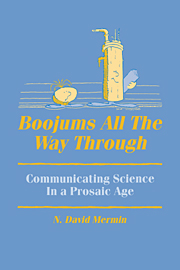Book contents
- Frontmatter
- Contents
- Preface
- I Reflections on the pursuit of physics
- 1 E pluribus boojum: The physicist as neologist
- 2 Commencement address, St. Johns College, Santa Fe, May 18, 1986
- 3 “One of the great physicists … and great characters”
- 4 My life with Landau
- 5 What's wrong with this Lagrangean?
- 6 What's wrong with this library?
- 7 What's wrong with this prose?
- 8 What's wrong with these equations?
- 9 What's wrong with these prizes?
- II The quantum theory
- III Relativity
- IV Mathematical musings
2 - Commencement address, St. Johns College, Santa Fe, May 18, 1986
Published online by Cambridge University Press: 02 December 2009
- Frontmatter
- Contents
- Preface
- I Reflections on the pursuit of physics
- 1 E pluribus boojum: The physicist as neologist
- 2 Commencement address, St. Johns College, Santa Fe, May 18, 1986
- 3 “One of the great physicists … and great characters”
- 4 My life with Landau
- 5 What's wrong with this Lagrangean?
- 6 What's wrong with this library?
- 7 What's wrong with this prose?
- 8 What's wrong with these equations?
- 9 What's wrong with these prizes?
- II The quantum theory
- III Relativity
- IV Mathematical musings
Summary
I have to say that the only other time I was asked to talk at a commencement was 1952, when I graduated from high school. So while I suppose I should have spent the last month thinking hard about the great challenges lying ahead for all of you, I was actually more preoccupied with the great challenge lying ahead for me. What can a middle aged theoretical physicist have to say to the graduating class of this unique college?
The answer came to me a few weeks ago, when I read in a pamphlet about St. John's College that the principal goal of a liberal education is to acquire the skills of rational thought, careful analysis, logical choice, imaginative experimentation, and clear communication. Having always regarded these as the primary tools of the physicist, I realized that I could do no better than to call to your attention a few examples of the application of these skills in public affairs, in private life, and on the frontiers of science.
Let's begin with clear communication in public affairs. Several years ago I was half listening to an early speech by a new President who was acquiring a reputation as a clear communicator. Talking about a trillion dollar national debt, he was saying: “A trillion dollars is so much money that it's hard to grasp the idea, so I want to tell you how to make it a little more real.”
- Type
- Chapter
- Information
- Boojums All the Way throughCommunicating Science in a Prosaic Age, pp. 26 - 34Publisher: Cambridge University PressPrint publication year: 1990

